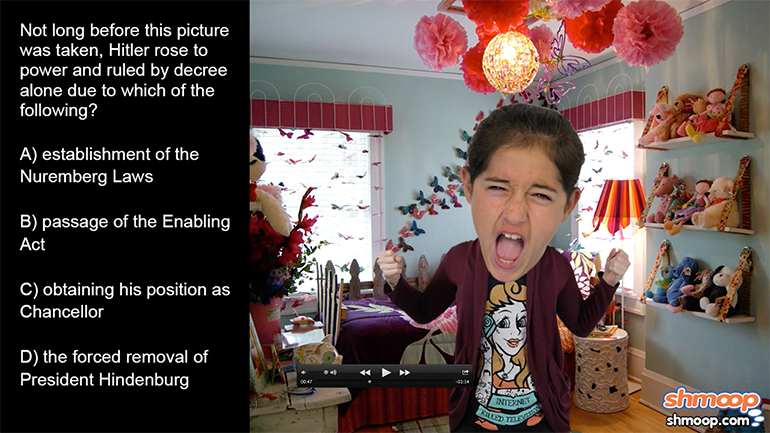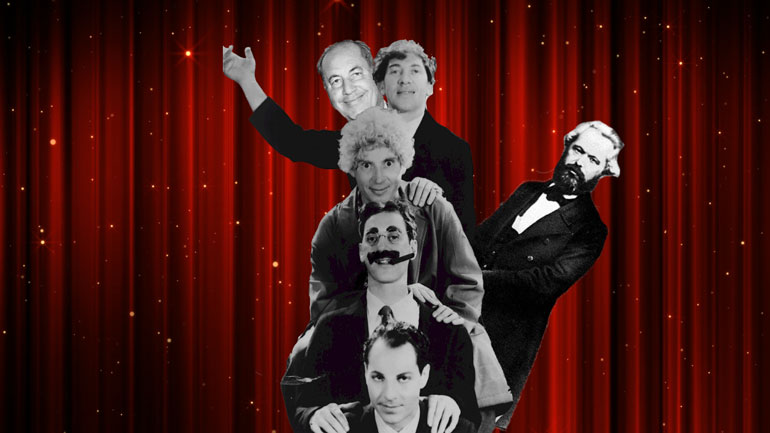ShmoopTube
Where Monty Python meets your 10th grade teacher.
Search Thousands of Shmoop Videos
AP European History 1.3 Period 3: 1815-1914 5 Views
Share It!
Description:
AP European History 1.3 Period 3: 1815-1914. Supporters of the passage would believe that which of the following was a direct result of European industrialization?
Transcript
- 00:04
And here's your shmoop du jour brought to you by angles, Friedrich was a
- 00:09
cute one, hey look at that face.. Now look at this passage.... [Freidrich pushes a chalkboard away]
- 00:14
[Mumbling]
- 00:18
[Mumbling]
- 00:23
okay and here's our question supporters of the passage
Full Transcript
- 00:26
above would believe that which of the following was a direct result of
- 00:29
European industrialization and here are your potential answers all right....
- 00:34
Well for the record European industrialization is [A factory building]
- 00:38
just like plain ol industrialization just you know with a fancy mustache
- 00:43
and a taste for champagne so what did Marx, Engles and their supporters make [Marx, Engle with fellow supporters]
- 00:47
of all the fancy shmancy factories and machines and stuff did they think that
- 00:52
it would lead to B? A decline in the overall population well seeing as
- 00:56
industrialization actually brought forth labor reforms and workers rights
- 00:59
the conditions for the working class improved and the overall population [Object hits worker on the head]
- 01:03
stabilized so this wouldn't make much sense at all and since we're talking
- 01:07
about Marxists, not surrealist some sense would definitely be helpful here that
- 01:12
eliminates B. Would they have believed that a result of industrialization
- 01:16
excuse us European industrialization was C - a decrease in urbanization while
- 01:23
since industrialization means that machines can finally stop directly [Machines running at a factory]
- 01:27
relying on water power factories moved to the city in search of cheaper labor
- 01:31
so urbanization was actually a natural result of industrialization meaning it
- 01:37
increased population in the big city, big time. So C's got to go as well what a
- 01:41
Marxist believe that one consequence of industrialization was D the emergence of
- 01:45
women's suffrage well unfortunately women's rights weren't a natural result [Woman asking a man if she can vote]
- 01:50
of industrialization whatsoever as women weren't allowed jobs that didn't fall
- 01:54
under the categories of menial and without any hope of advancement which
- 01:59
are okay categories if you're like an alpaca but not so much of your a human [Job openings on a board and alpaca appears]
- 02:03
sorry alpacas no disrespect meant.... that means that supporters of the
- 02:09
passage would believe that a direct result of European industrialization was
- 02:13
A - the birth of new socio-economic classes so you can thank the industrial
- 02:17
revolution for that classic Thanksgiving question what do you want to be when you [Guys having thanksgiving dinner]
- 02:21
grow up well prior to the revolution you were born a laborer or an aristocrat and
- 02:26
you would die one after the revolution a wealth of possibilities opened up
- 02:30
merchants, doctors, lawyers, teachers and many years later professional reality TV star [Doctors, merchants, lawyers and TV stars appear]
- 02:36
oh brave new world that has such Kardashians in it all those became
- 02:41
possible well these new urban professions brought forth a variety of
- 02:44
new socio-economic classes in between commoner and aristocrats so A is the [Man stands between commoner and aristocrat]
- 02:49
correct answer now if you'll excuse us we got to go spend some quality time
- 02:52
advancing our career in Halo or Sims we got a wide variety of interest [Computer games on a shelf]
Up Next
AP European History Period 1: 1450-1648 Drill 2, Problem 1. As a result of the meeting in the image, which of the following occurred?
Related Videos
AP European History Period 3: 1815-1914 Drill 2, Period 1, Les Demoiselles d'Avignon represented the beginning of which of the following art m...
AP European History Period 3: 1815-1914 Drill 2, Problem 4. Paintings like the one depicted above were a direct reflection of what?
AP European History 1.2 Period 4: 1914-Present Not long before this picture was taken, Hitler rose to power and ruled by decree alone due to which...
AP European History 1.4 Period 3: 1815-1914. As evidenced through the passage above, Karl Marx was a passionate leader and is considered the father...




